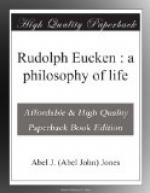It need hardly be pointed out that all these branches are very closely related, and that a discussion of any one of them involves to some extent a reference to the others. One cannot, for example, attempt to solve the great question of reality without touching upon the possibility of knowledge, without some reference to the processes of the human mind, and the standards of the validity of thought, of the good, and of the beautiful.
It is however essential, if one is to appreciate a philosopher, to understand clearly what his main problem is. Therein lies frequently the differences among philosophers—that is, in the special emphasis laid on one problem, and the attention to, or neglect of other aspects. To fail to be clear on this matter frequently means to misunderstand a philosopher.
And it would seem that many critics have failed to appreciate the work of Eucken to the extent they should, because they have expected him to deal in detail with problems which it is not his intention to discuss, and have failed to appreciate what special problem it is that he attempts to solve.
Eucken’s special problem is that of the reality in the universe, of the unity there exists in the diversity of things. In so far as he makes this his problem, he is at one with other philosophers in investigating what may perhaps be considered to be the most profound problem that the human mind has ever conceived. The fact that distinguishes Eucken from a large number of other thinkers is that he starts where they leave off. At a rule, philosophers




